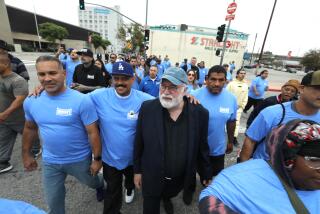Friends in high places seek leniency for Karatz
- Share via
Bruce Karatz, homeboy?
The former KB Home chief executive, who is to be sentenced Wednesday on three felony convictions in a stock option manipulation case, has been volunteering his services for the last six months at the Homeboy Industries gang-intervention program in Los Angeles.
Karatz has helped the financially troubled agency by “finding bold and creative ways to broaden our brand, increase the revenue in our businesses and invite more stakeholders to invest,” said Father Gregory Boyle, Homeboy’s founder and executive director.
The buttoned-down businessman also takes time to mentor former gang members looking to turn their lives around, Boyle said in a letter to U.S. District Judge Otis D. Wright II.
Boyle is one of dozens of community leaders, business executives and politicians who have urged Wright to show leniency to Karatz, who was convicted in April of lying about the way KB Home, the Westwood home construction giant, handled executive stock options.
Defense attorney John Keker said in court papers that letters vouching for Karatz’s character from Boyle and others — including KB Home co-founder Eli Broad, former Los Angeles Mayor Richard Riordan and former New Orleans Mayor C. Ray Nagin — showed that Karatz is worthy of leniency. He noted that Karatz donated $125,000 to Homeboy Industries and has pledged an additional $1 million, helping the agency rehire 100 workers who had been laid off because of a steep decline in charitable contributions needed to fund operations.
“These letters make one thing clear: Mr. Karatz is a deeply good man,” Keker wrote. “This is not a man who simply shared his wealth. He extensively shared his expertise and time as well.”
The federal probation office tended to agree, recommending that Karatz be sentenced to home confinement for eight months, pay a fine, complete 2,000 hours of community service and remain on probation for five years.
But prosecutors want Karatz to be fined $7.5 million and sentenced to 61/2 years in prison, pointing out in court papers last month that the proposed home detention would be served “in defendant’s 24-room Bel-Air mansion situated on a one-acre estate.”
They also questioned the relevance of Karatz’s work with Homeboy Industries, which they said began one month after his conviction.
Asst. U.S. Attorneys Paul Stern and Harvinder Anand said in court papers last week that the judge should view Karatz’s philanthropic activities with “some measure of caution, if not skepticism” because his actions may show less about his character than a “strategic decision to place himself in the best possible light for sentencing.”
“It is curious that defendant’s affiliation with Homeboy only commenced following his convictions,” the prosecutors said.
The unlikely pairing of the 65-year-old former leader of a multibillion-dollar home-building company with former gang members could have relevance in a criminal proceeding, said Carol A. Chase, a Pepperdine University School of Law professor.
“By offering evidence of his good character, what the defense is attempting to do is get the judge to look at what they would argue is a relatively minor transgression by a person who has done so much good for the community,” said Chase, a former federal prosecutor.
“Part of what the judge is doing on sentencing is trying to take into account the person’s character,” she said.
At trial, prosecutors portrayed Karatz as a greedy executive who approved the backdating of stock options so that he and other executives could make millions in extra pay. Prosecutors said Karatz himself picked up more than $10.9 million in additional gains by cashing in his backdated options.
Stock options allow employees to buy shares at a set price, typically the price on the date they were granted. Companies can boost the value of these options by backdating them to dates when the stock price was lower. The practice is not illegal as long as companies disclose it and account for it as a compensation expense in public filings.
KB Home restated earnings in 2007 to account for $36 million in unreported expenses related to the options.
The jury rejected the government’s claim that Karatz intentionally defrauded shareholders by secretly backdating stock option grants from 1999 to 2005 to make them more valuable. But it found him guilty of lying about the backdating to KB accountants and in a 2006 quarterly report.
Karatz spent more than 20 years at KB Home, guiding the company to extraordinary growth. Under his watch, revenue grew from $491 million in 1986 to $11 billion in 2006, the year he left amid questions about the options.
Since his conviction Karatz has remained free on bond, secured by his Bel-Air mansion.
More to Read
Sign up for Essential California
The most important California stories and recommendations in your inbox every morning.
You may occasionally receive promotional content from the Los Angeles Times.














